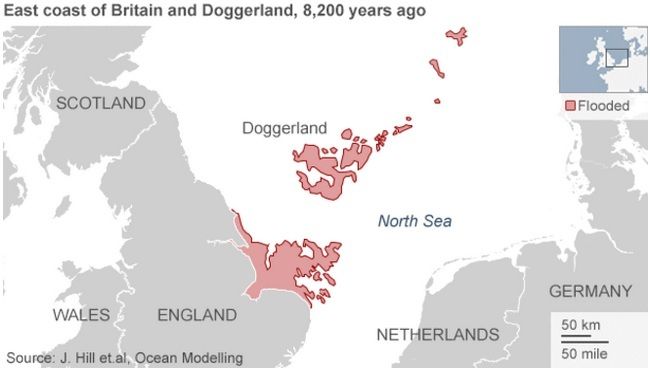Post by UKarchaeology on Sept 26, 2015 21:08:35 GMT
(2013 article)
Evidence has been uncovered of a huge tsunami, which cut Britain off from the rest of Europe 8,000 years ago.
Excavations at Low Hauxley, near Druridge Bay in Northumberland, have unearthed material, which experts say, was deposited by the giant tidal wave.
The dig is part of a £300,000 project investigating a Bronze Age burial mound - or cairn.
Lead archaeologist, Dr Clive Waddington, described the site as a "staggering find".
During the Mesolithic period - in about 6,100 BC - Britain broke free of mainland Europe for good, after landslides in Norway triggered a huge tsunami.
The water struck the north-east of Britain and travelled 25 miles (40km) inland, turning low-lying plains into what is now the North Sea.
'Catastrophic event'
Dr Waddington said the Low Hauxley site was the most southerly point on the British Isles where evidence of the tsunami had been found.
He said: "The deposits we have found are in a gravel-type layer with quite large blocks of stone dating back about 8,000 years.
"This material was dumped by the sea in what was a catastrophic event at the time.
"We hope this discovery will flesh out the story of how Britain became an island as well as tell us about what the environment was like at that time here in Druridge Bay."
The project is a partnership between the Northumberland Wildlife Trust and Derbyshire-based Archaeological Research Services Ltd (ARS), with funding from the Heritage Lottery Fund.
Philippa Cockburn, of ARS said the deposits amounted to "impressive new evidence" of how Britain was formed.
She said: "The deposits are in the form of water-rounded pebbles and rocks which are below Mesolithic soil at Low Hauxley.
"The soil contains thousands of flint tools which, based on their shape and method of manufacture, date to around 6,000 BC. This means that the tsunami debris situated below it must date to immediately before this period.
"Prior to this event, Britain was connected from an area around the Wash over to the low countries. But due to the effect of the tsunami in combination with rising sea levels, Britain became an island."
(video, pic & source: www.bbc.co.uk/news/uk-england-tyne-23779202 )
Evidence has been uncovered of a huge tsunami, which cut Britain off from the rest of Europe 8,000 years ago.
Excavations at Low Hauxley, near Druridge Bay in Northumberland, have unearthed material, which experts say, was deposited by the giant tidal wave.
The dig is part of a £300,000 project investigating a Bronze Age burial mound - or cairn.
Lead archaeologist, Dr Clive Waddington, described the site as a "staggering find".
During the Mesolithic period - in about 6,100 BC - Britain broke free of mainland Europe for good, after landslides in Norway triggered a huge tsunami.
The water struck the north-east of Britain and travelled 25 miles (40km) inland, turning low-lying plains into what is now the North Sea.
'Catastrophic event'
Dr Waddington said the Low Hauxley site was the most southerly point on the British Isles where evidence of the tsunami had been found.
He said: "The deposits we have found are in a gravel-type layer with quite large blocks of stone dating back about 8,000 years.
"This material was dumped by the sea in what was a catastrophic event at the time.
"We hope this discovery will flesh out the story of how Britain became an island as well as tell us about what the environment was like at that time here in Druridge Bay."
The project is a partnership between the Northumberland Wildlife Trust and Derbyshire-based Archaeological Research Services Ltd (ARS), with funding from the Heritage Lottery Fund.
Philippa Cockburn, of ARS said the deposits amounted to "impressive new evidence" of how Britain was formed.
She said: "The deposits are in the form of water-rounded pebbles and rocks which are below Mesolithic soil at Low Hauxley.
"The soil contains thousands of flint tools which, based on their shape and method of manufacture, date to around 6,000 BC. This means that the tsunami debris situated below it must date to immediately before this period.
"Prior to this event, Britain was connected from an area around the Wash over to the low countries. But due to the effect of the tsunami in combination with rising sea levels, Britain became an island."
(video, pic & source: www.bbc.co.uk/news/uk-england-tyne-23779202 )

